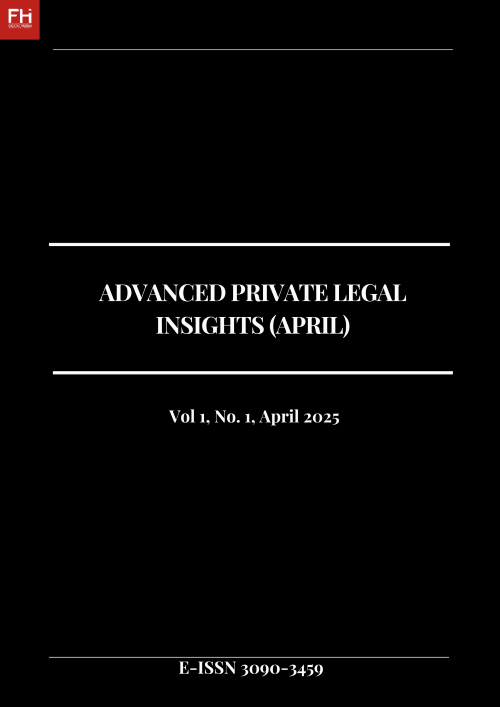Legal Force of Information Technology-Based Money Lending Agreements
DOI:
https://doi.org/10.56087/9qxens49Keywords:
Legal Force, Agreement, Borrowing and Lending, Information TechnologyAbstract
This study aims to determine the legal validity of information technology-based loan agreements. The research method used is normative legal research, which utilizes secondary data sources. These sources include the opinions of experts or specialists who study books, journals, and literature on the legal basis of contracts and laws and regulations. The research findings indicate that Information Technology-Based Lending Services (Fintech Lending) are an innovation in the financial sector that enables online lending and borrowing transactions using electronic systems. Online loan agreements are regulated by Financial Services Authority Regulation Number 10/POJK.05/2022. These agreements are legally valid and enforceable as long as they meet the legal requirements as stipulated in Article 1320 of the Civil Code, namely agreement, capacity, a specific matter, and a lawful cause. Dispute resolution in information technology-based loan agreements in the event of default can be carried out through litigation or non-litigation. Litigation is commonly referred to as the path taken in court, while non-litigation is through Alternative Dispute Resolution Institutions (LAPS), which include mediation, arbitration, and binding opinions. This research recommends educating users about the terms and conditions of agreements, focusing on legal validity and certainty, and strengthening regulations on personal data security and dispute resolution mechanisms.
References
[1] A. Aswari, “Perlindungan Hukum Tanpa Penegakan Hukum Dalam Sengketa Transaksi Elektronik,” Kertha Patrika, vol. 42, no. 2, p. 163, 2020, doi: 10.24843/kp.2020.v42.i02.p05.
[2] A. P. Buana, A. Aswari, M. F. Said, and M. Y. Arifin, “Responsibility Parking Service Business to The Protection Of Consumer Of The Parking Services in Makassar,” Subst. Justice Int. J. Law, vol. 1, no. 1, p. 23, 2018, doi: 10.33096/substantivejustice.v1i1.15.
[3] A. Prawira Buana, H. Hasbi, M. Kamal, and A. Aswari, “Implikasi Pelaksanaan Perjanjian Jual Beli Telepon Seluler Ilegal (Black Market),” JCH (Jurnal Cendekia Hukum), vol. 6, no. 1, p. 117, 2020, doi: 10.33760/jch.v6i1.268.
[4] Y. Dianti, “Analisis Penegakan Hukum Terhadap Tindak Pidana Ujaran Kebencian Melalui Media Elektronik,” Angew. Chemie Int. Ed. 6(11), 951–952., pp. 5–24, 2017, [Online]. Available: http://repo.iain-tulungagung.ac.id/5510/5/BAB 2.pdf
[5] R. A. R. M. Dewi and C. Susantio, “Penggunaan Sertifikat Elektronik untuk Meningkatkan Efisiensi Pendaftaran Tanah dalam Upaya Pencegahan Mafia Tanah,” J. Syntax Admiration, vol. 5, no. 9, pp. 3382–3392, 2024, doi: 10.46799/jsa.v5i9.1441.
[6] C. Oeliga, Rasmini, and Johanes, “Hukum Pidana Bagi Pelaku Penipuan Transaksi Elektronik Jual Beli Online (E-Commerce) di Indonesia,” Datin Law J., vol. 3, no. 2, pp. 145–152, 2022.
[7] M. Fauzi Ramadhan, “Pengantar Ilmu Hukum.” 2016.
[8] M. F. Ramadhan, “Legal Review of Action Criminal Exploitation of Street Children at Crossroads in the Name of Beggars,” vol. 1, no. 2, pp. 1–7, 2025.
[9] M. F. Ramadhan, A. Asis, and A. M. Muin, “Law Enforcement Of The Crime Of Illegal Fishing In The Waters Area Of Pangkajene Regency And The Islands,” vol. 11, no. 3, pp. 1904–1909, 2022, doi: 10.35335/legal.
[10] N. Qamar et al., “Metode Penelitian Hukum (Legal Research Methods),” no. December, p. 176, 2017.
[11] M. Hatta et al., “Internet and Terrorism in Indonesia,” J. Phys. Conf. Ser., vol. 1114, no. 1, 2018, doi: 10.1088/1742-6596/1114/1/012080.
[12] E. Fauzi, M. Visar Sinatrya, N. Daru Ramdhani, R. Ramadhan, and Z. Muhammad Rasid Safari, “Pengaruh kemajuan teknologi informasi terhadap perkembangan akuntansi,” J. Ris. Pendidik. Ekon., vol. 7, no. 2, pp. 189–197, 2022, doi: 10.21067/jrpe.v7i2.6877.
[13] Asmawi, Syafei, and M. Yamin, “Pendidikan Berbasis Teknologi Informasi Dan Komunikasi,” Pros. Semin. Nas. Pendidik., vol. 3, pp. 50–55, 2019.
[14] S. U. Lathifah, “Perkembangan Teknologi Informasi di Indonesia | kumparan.com,” Kompasiana.com, pp. 1–7, 2022, [Online]. Available: https://www.kompasiana.com/muhammad75161/63272f356e14f10616141444/perkembangan-teknologi-informasi-di-indonesia?lgn_method=google
[15] A. Puspita and A. N. Handayani, “Dampak Teknologi Digital Terhadap Perilaku Sosial Masyarakat 5.0,” J. Inov. Teknol. dan Edukasi Tek., vol. 2, no. 10, pp. 446–451, 2022, doi: 10.17977/um068v2i102022p446-451.
Downloads
Published
Issue
Section
License
Copyright (c) 2025 Dhaly Grendi Yambo, Lauddin Marsuni, Aan Aswari

This work is licensed under a Creative Commons Attribution-ShareAlike 4.0 International License.


